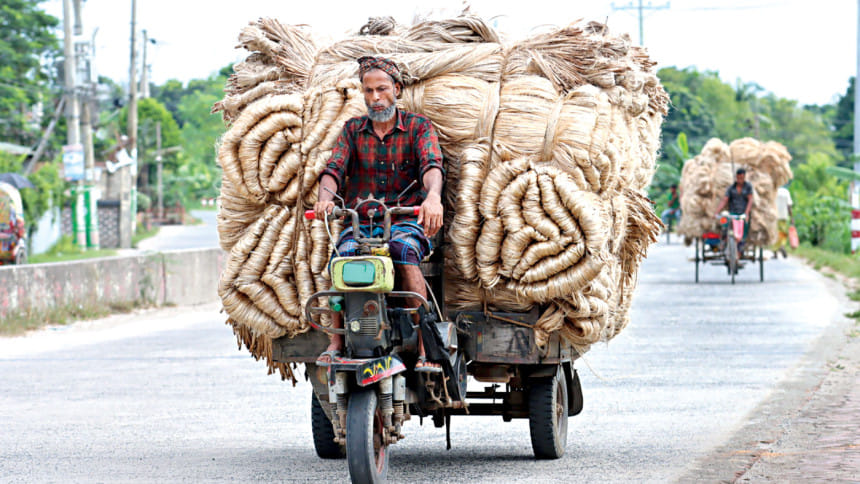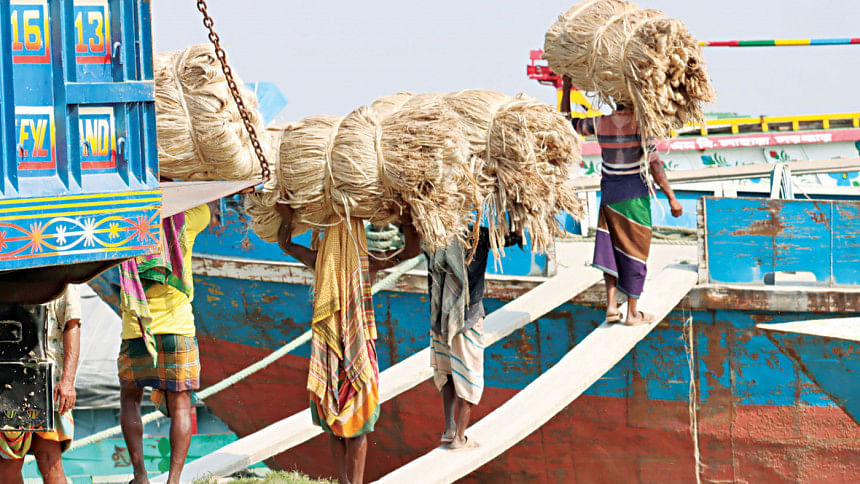Jute prices surge as production plummets

Raw jute production in Bangladesh has declined by nearly 10 percent year-on-year, mainly due to punishing heat during the planting period in March and April.
Heatwaves were recorded on at least 23 days in April, with temperatures peaking at around 42 degrees Celsius.
The unprecedented temperatures hindered seed germination and strained supply, which was also impacted by local farmers reducing jute acreage in recent years thanks to declining prices.
Following the drop in the production of raw jute -- once dubbed the "golden fibre" of Bangladesh -- prices have already soared by at least 22 percent.
Jute growers and traders said the finest quality jute is currently selling for around Tk 3,600 per maund (37 kilogrammes), up from Tk 3,200 just ten days ago and Tk 2,700 last year.
Medium-quality jute prices have also increased by Tk 500 per maund to Tk 2,700 since last year.
Farmers in major jute-producing districts like Faridpur and Mymensingh anticipate further price hikes to Tk 4,000 per maund soon due to the emergence of a supply-demand gap.
According to the Department of Jute, raw jute production this year is projected to be around 7,574,000 bales (one bale is around 182 kilogrammes), compared to 8,414,000 bales in fiscal year 2023-24.
Arifujjaman Chan, a jute trader from the Kanaipur market, one of the largest in Faridpur, said prices are rising daily due to high demand.

Many traders are buying in bulk, he said, anticipating that prices would reach Tk 4,000 per maund soon.
Julhas Mia, a jute grower from Hatkrishnapur village, said increased costs for fertiliser, irrigation and labour had pushed cultivation costs to Tk 27,000-30,000 per bigha (1,338 square metres).
"Still, yields are low as jute seeds could not germinate properly due to excessive heat during the planting period. Many plants died due to lack of rain," he said.
Imarat Matabbar, a jute grower from Baliadangi village under Saltha upazila of Faridpur, said: "I cultivated jute on 3 bighas of land this year at a cost of Tk 80,000. I harvested 35 maunds of raw jute and sold five maunds at Tk 3,200 per maund compared to Tk 2,700 last year."
Isarat Matubbar, another jute grower from the Chotto Bahirdia village of the same upazila, said he used to cultivate jute on 5 bighas but reduced it to 2 bighas due to high cultivation costs and low prices.
In Mymensingh, farmers are also happy with raw jute prices. Medium-quality jute is fetching Tk 2,000 to Tk 2,400 per maund while the finest quality costs Tk 3,200 to Tk 3,400 per maund.
Mohammad Johirul Hoque, a farmer from Char Gobindapur village, said medium-quality jute was priced at Tk 1,600 while the finest quality was Tk 2,500 per maund last year.
Md Zahidul Islam, an assistant director at the Department of Jute in Faridpur, said many farmers stopped growing jute in recent years.
"Many of them shifted to maize cultivation instead, leading to low jute production in Faridpur," he added.
Md Rashedul Hasan, deputy director of the Department of Jute, said the government's special measures to reduce the use of polythene bags in favour of jute bags had partly increased the demand for jute.
He also acknowledged that the total production of jute decreased this year due to adverse weather conditions.
"But farmers produced good quality jute this season and are getting good prices. With better prices, farmers will increase jute production in upcoming seasons."

 For all latest news, follow The Daily Star's Google News channel.
For all latest news, follow The Daily Star's Google News channel. 



Comments